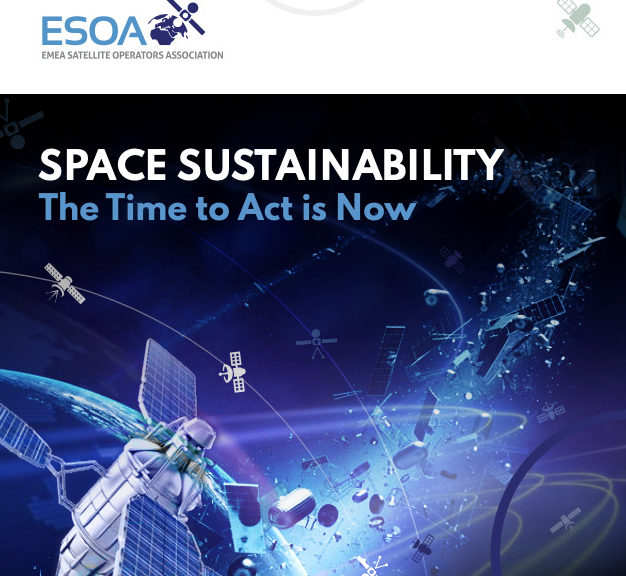Space Sustainability – The Time to Act is Now, says ESOA
ESOA, the primary trade association for European and Middle Eastern based satellite operators, published on 22 September 2021 a report recognizing, ‘The increased interest in space and pace of launches in recent years highlights the need for action to deal with space debris and collisions and to ensure space remains sustainable, safe and accessible for all.’
The Astroscale team welcome the release of this ESOA report, and the acknowledgement of our exponential dependence on space services and data to respond to climate change, security, GPS, and other data-driven communications services.
The report calls for ‘prompt action’ to prevent the risks of debris and collisions from growing progressively worse. To support this, ESOA calls for, ‘A transparent and flexible regulatory regime, implemented at national and international levels’ to safeguard space for future generations.
Astroscale wholeheartedly agrees with the need to move at pace to develop further advancements in our regulatory regimes to support mitigation, remediation, and disposal initiatives. Our company continues to work hard to deliver the required technologies and capabilities through the development of our multi-debris removal service, ELSA-M for clients in Low Earth orbit (LEO), and our latest Life Extension (LEX) service for Geo-stationary orbit (GEO) spacecraft to extend their valuable time in orbit.
The report highlights several benefits with a ‘flexible technology-neutral regime’ that can:
- Minimize the creation of more debris in space;
- Maximize orbital resources through appropriate space traffic management, including for launches; and
- Enable the development of responsible solutions to existing and future orbital debris.
ESOA highlight that more can and should be done at the international and national levels to establish binding rules for responsible practices and behaviour in space. Suggestions include the adoption of ‘basic rules like requiring satellite manoeuvrability and prohibiting the intentional creation of debris to help promote a viable, thriving space economy.
ESOA further indicates that ‘a failure to act now to develop and implement broadly accepted and a harmonised regime for space sustainability could render space substantially less accessible, threatening the delivery of critical services relied upon by those on Earth.’
John Auburn, Managing Director of Astroscale UK comments, “At Astroscale, we strongly believe what goes up must come down, we want to see this become the only way of doing business in LEO. Our ELSA-M service will provide value for operators by offering the chance to remove multiple pieces of satellite debris in a single mission, whilst our docking plates will help to prepare satellites for removal in the future.”
ESOA recommend three focus areas for further action: space debris mitigation, space situational awareness, and remediation and disposal, with specific recommendations such as incorporating aggregate (system-wide) collision probability limits on non-geostationary orbit (NGSO) systems that minimize the creation of orbital debris.
The ESOA paper recommends “Satellite operators are encouraged to implement remediation and disposal techniques for future NGSO and GSO satellite systems taking into account commercial, technical, regulatory, and space orbital environmental safeguarding objectives.”
In addition, the report suggests a reduction in the post mission disposal (PMD) timeframe for LEO constellations satellites from the current 25 years. At Astroscale, we’d like to see that reduction head towards 5 years with the support of disposal services to accelerate this trajectory.
Kumar Singarajah, Director of Government and Regulatory Affairs (UK & Europe) comments, “We appreciate ESOA’s timely efforts to summarise a clear, forward looking and proactive position on space sustainability and look forward to working with satellite operators to deliver on-orbit servicing and Active Debris Removal programmes that further our shared ambitions.”

 Visit U.S. Site
Visit U.S. Site




